Community, country and cattle are intertwined at Delta
18 November 2024
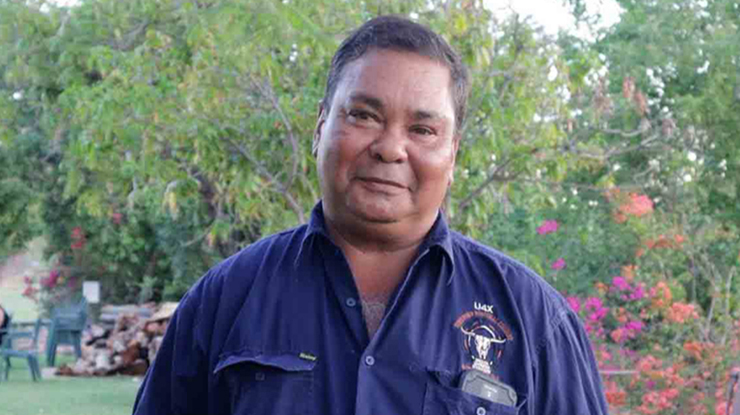 Chairman of Morr Morr Pastoral Company and Kurtijar traditional owner Fred Pascoe. Image: Tim Gentle – Think Digital Studios.
Chairman of Morr Morr Pastoral Company and Kurtijar traditional owner Fred Pascoe. Image: Tim Gentle – Think Digital Studios.
Run by the Kurtijar Aboriginal Corporation, ‘Delta Downs Station’ is so much more than one of Australia’s most successful Indigenous-owned and run pastoral enterprises.
As Kurtijar Elder and one of the traditional owners of Delta Downs Station Fred Pascoe reflects, the station – north of Normanton in Far North Queensland – is also a treasured place of cultural significance which provides an abundant source of bush foods and hunting grounds for its custodians.
Home to a spectacular array of wildlife, its thriving wetlands brim with fish, turtles and migratory birds. Its wide range of landscapes include ridge and forest country and coastal areas which provide prime cattle country for its 45,000 head of predominantly red Braham cattle.
Delta’s well-established and ongoing business success acts as a richly fertile incubator for
Indigenous self-determination, employment and social cohesion.
Established in 1889, it took almost 100 years for Delta to become Australia’s first cattle station run by Traditional Owners. Delta now employs 35 local Indigenous people and since 2021 has been an active participant in MLA’s producer-led Northern Breeding Business (NB2) program.
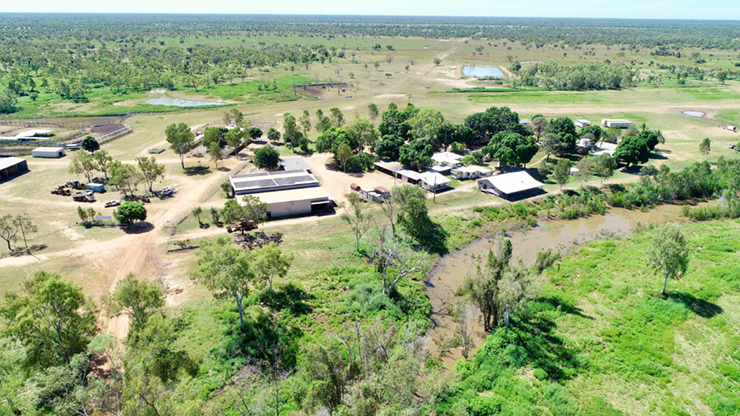
A bird’s-eye view of Delta Downs Station. Image: Tim Gentle – Think Digital Studios.
Business development
Co-funded by the Indigenous Land and Sea Corporation (ILSC) and Animal Health Australia, NB2 is a capacity building program which engages participants in peer-to-peer learning, business analysis and skills development (see story on page 20–21 of MLA’s Spring 2024 edition of Feedback Magazine).
The ILSC’s participation in the program aims to create opportunities for Indigenous-owned pastoral enterprises by encouraging and funding their involvement.
NB2 has a specific focus on supporting businesses to implement strategies to improve calf survival and breeder reproduction. Ample networking opportunities and a delivery model based on respect and community-led decision making are central to the program’s high level of buy-in from a growing number of Indigenous pastoral groups.
“Being part of NB2 is a good way for Delta to share its knowledge and experience with other Indigenous groups newer to the industry. It’s been worthwhile learning from other participants as well as from mainstream industry,” Fred said.
By working together and strengthening networks with other Indigenous-led businesses, Fred said NB2 has opened up a range of positive outcomes to explore.
These include:
- branded beef opportunities
- helping people get established with breeders
- agistment opportunities
- getting involved in other markets
- bulk marketing and bulk purchasing.
“Being able to sit down and have a cup of tea and talk about what other groups are doing in terms of carbon farming and managing for biodiversity is another benefit we see from the program,” Fred said.
Building links for lasting benefits
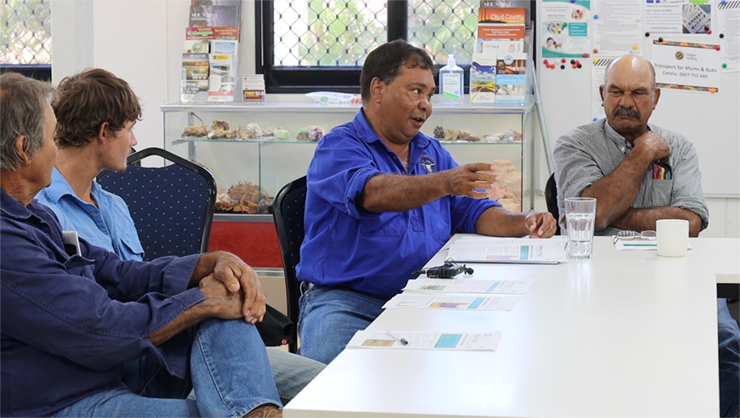
Fred Pascoe (second from right) presenting at an NB2 workshop held in Malbonvale in Mt Isa. Image: Tim Gentle – Think Digital Studios.
NB2 has given Delta access to the latest evidence-based on-farm practices to boost productivity specific to northern cattle enterprises, as well as the opportunity to meet in-person with specialists from the wider red meat industry.
NB2’s support and facilitation of networking events, including residential workshops and on-farm training sessions at Delta is something Fred would like to expand on going forward.
“We want to get a wider range of employees out to the residential workshops and meetings we hold here at Delta. We get access to technical and financial advice from industry experts which has been very useful,” Fred said.
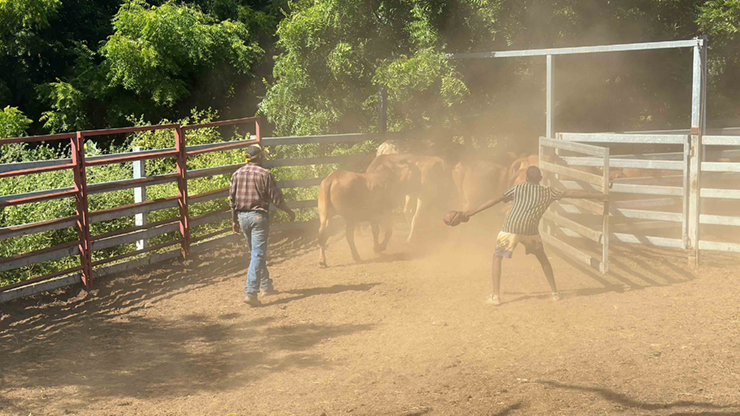
Moving cattle in the yards at Delta Downs Station. Image: Tim Gentle – Think Digital Studios.
Building business skills
Fred sees the business management training side of the NB2 program as being particularly advantageous in the current economic circumstances.
“In today’s environment the cost of everything needed to run a business has gotten higher – it’s not in-line with what it costs you to run it anymore. You need to be on the ball to be profitable,” Fred said.
Boosting productivity
Breeder management at Delta includes pregnancy tests and culling dry cattle, and benchmarking is now being implemented through NB2.
“In two years, we should be seeing improvements in our productivity. The technical training has been good – benchmarking is helping us see how we’re travelling compared to the rest of the industry,” Fred said.
Culling dry cows and increasing calving rates offer benefits beyond a more fertile herd and improved pasture utilisation.
“By getting rid of dry cows we’ll have a smaller, more productive herd, so we’ll still be able to employ more people. The land will also benefit with less cattle numbers – it’s a win-win.
“We have a duty to employ local Indigenous employees – we’re one of the largest Indigenous employers in this region but the more people you employ, the less profit you make. At the end of the day business needs to be profitable, however our profits are directed straight back into the community,” Fred said.
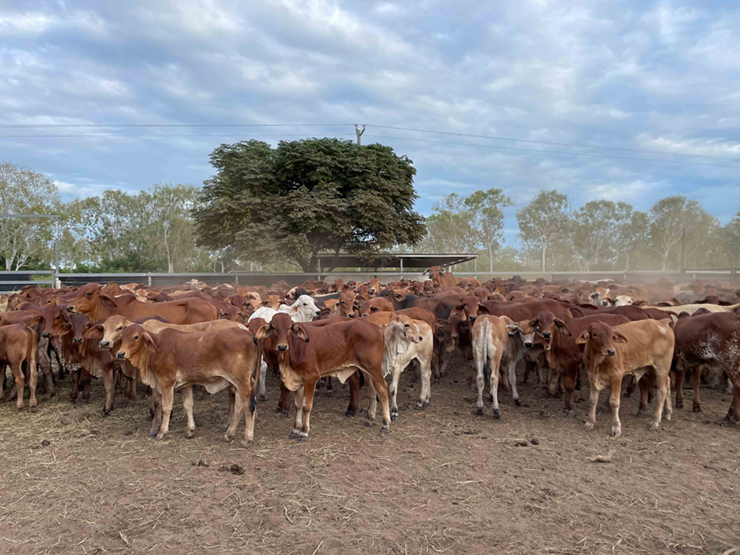
Cattle in the yards at Delta Downs Station. Image: Rob Barwell.
Protecting wetlands a priority
Delta’s lush wetlands are highly valued by the community which simultaneously cares for and is nurtured by them. Protecting it from impaction from livestock and the effects of invasive animals such as feral pigs is an ongoing priority.
“We have a rolling program where we fence off the wetlands so we can reduce the havoc feral pigs cause to native animals. They destroy the magpie geese nests and decimate turtles,” Fred said.
“The wetlands are a haven for birds – we’re on a migratory bird route and have a role to play in protecting them. By doing this our community also benefits through access to plentiful bush tucker and fish.”
More than just a cattle company
Fred provides insight into his community’s perspective on its ownership of Delta Downs – and it’s one centred around custodianship rather than a utilitarian approach.
“When we got our property, we didn’t just get our cattle company. We got land that our people now have access to for hunting and fishing and reinvigorating culture. We take our old people out to be buried on our land – it’s a hell of a lot more than just a cattle company,” Fred said.
Delta also provides a flourishing and continually replenishing food bowl for local Indigenous people – many of whom rely on it as a significant supplement to their overall diet.
“On the weekends we get 20 to 100 people coming out to hunt and fish – the majority of them are from a low socioeconomic background so it’s really a supermarket where they can stock their fridges,” Fred said.
Self-determination
In its facilitation of networking and business development opportunities, NB2 aims to act as a catalyst for ongoing success.
“Our 40-odd year history of success drives self-determination in our community. We are good cattlemen and horsemen, and we need to convince the wider industry that we are also good businessmen,” Fred said.
“Delta is an example of a thriving, Indigenous-run business which supports its community and shares its knowledge with our Indigenous colleagues.”


